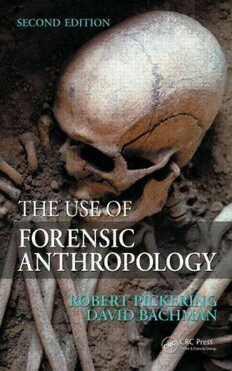Download The Use of Forensic Anthropology PDF Free - Full Version
Download The Use of Forensic Anthropology by Robert B. Pickering, David Bachman in PDF format completely FREE. No registration required, no payment needed. Get instant access to this valuable resource on PDFdrive.to!
About The Use of Forensic Anthropology
A forensic investigation requires a team of specialists from many different scientific fields of study along with legal and law enforcement specialists. In recent years, the range of cases on which forensic anthropologists have been consulted has expanded dramatically. The Use of Forensic Anthropology provides these professionals with guidelines for determining how to choose and when to use a forensic anthropologist. The book begins with a historical overview of the field of forensic anthropology, and then presents basic information about how to approach a forensic recovery site. When skeletal or severely decomposed remains are discovered, normal methods of identification such as facial recognition and fingerprinting are ineffective. This book offers insights on how to find the right professional to assist with these difficult cases. One of the key features is a chapter which presents a series of ten questions that must be answered, in order, about each case. Using this checklist will ensure the team working on the case that no stone is left unturned. Later chapters examine the relevance of race, ethnicity, and ancestry, determination of time of death, new investigation techniques, DNA, and categories of trauma. The final chapter brings the various parts of the process together to reconstruct a case. The first responder to a scene with skeletal remains and the law enforcement agencies who become involved will likely be confronted with evidence that they cannot interpret. This volume provides a bridge for these professionals, enabling them to develop a standard protocol for investigating skeletal remains, highlighting important questions that must be answered, and assisting them in finding the right forensic anthropologist to solve the puzzle of an unexplained death.
Detailed Information
| Author: | Robert B. Pickering, David Bachman |
|---|---|
| Publication Year: | 2009 |
| ISBN: | 9781420068771 |
| Pages: | 228 |
| Language: | English |
| File Size: | 6.836 |
| Format: | |
| Price: | FREE |
Safe & Secure Download - No registration required
Why Choose PDFdrive for Your Free The Use of Forensic Anthropology Download?
- 100% Free: No hidden fees or subscriptions required for one book every day.
- No Registration: Immediate access is available without creating accounts for one book every day.
- Safe and Secure: Clean downloads without malware or viruses
- Multiple Formats: PDF, MOBI, Mpub,... optimized for all devices
- Educational Resource: Supporting knowledge sharing and learning
Frequently Asked Questions
Is it really free to download The Use of Forensic Anthropology PDF?
Yes, on https://PDFdrive.to you can download The Use of Forensic Anthropology by Robert B. Pickering, David Bachman completely free. We don't require any payment, subscription, or registration to access this PDF file. For 3 books every day.
How can I read The Use of Forensic Anthropology on my mobile device?
After downloading The Use of Forensic Anthropology PDF, you can open it with any PDF reader app on your phone or tablet. We recommend using Adobe Acrobat Reader, Apple Books, or Google Play Books for the best reading experience.
Is this the full version of The Use of Forensic Anthropology?
Yes, this is the complete PDF version of The Use of Forensic Anthropology by Robert B. Pickering, David Bachman. You will be able to read the entire content as in the printed version without missing any pages.
Is it legal to download The Use of Forensic Anthropology PDF for free?
https://PDFdrive.to provides links to free educational resources available online. We do not store any files on our servers. Please be aware of copyright laws in your country before downloading.
The materials shared are intended for research, educational, and personal use in accordance with fair use principles.

